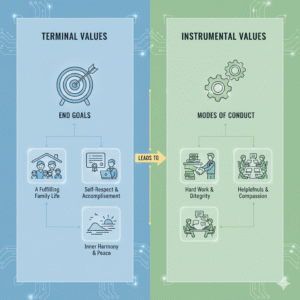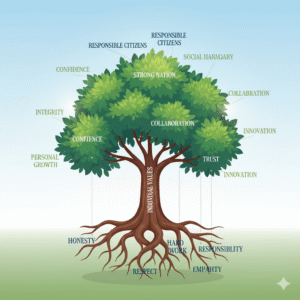What is Value in Civic Education, Definition Importance and Types of value
Introduction
Are you studying Civic Education? Do you ever wonder what “values” really mean? Understanding what is value in Civic Education is a very important part of the subject.
It’s not just about rules; it’s about understanding the beliefs that shape our society. This guide will explain the meaning of value, its importance, and the different types you need to know.

What is the concept of value?
Values are the basic beliefs that guide our actions and judgments.
They are the principles you believe are important in the way you live and work. Think of them as your personal guide for what is good, right, and desirable. They are the “why” behind your choices.

What is the meaning of value in Civic education?
So, what is value in Civic Education? In this subject, “value” means the shared beliefs and principles that a society accepts as right, proper, and good.
These are the standards that guide how citizens should behave toward each other and toward the community. Understanding what is value in Civic Education is the foundation of good citizenship and helps a nation, like Nigeria, stay strong and united.

What are the Types of Value
Values are not all the same. They can be broken down into different types. Here are the main types of value you will learn about in Civic Education.
Terminal Values
These are the ultimate goals you want to achieve in your life. They are the “end” you are working toward. Examples include happiness, freedom, self-respect, and national security.
Instrumental Values
These are the “means” or behaviours that help you achieve your terminal values. They are the preferred ways of acting.
Examples are honesty, responsibility, courage, and being ambitious. For instance, you use honesty (instrumental) to achieve self-respect (terminal).

Dominant Values
These are your strongest values. They are the main principles that guide you, especially when you have to make a tough choice. When two values conflict, your dominant value is the one you will likely follow.
Cultural Values
These are the shared values of a community or society, like our communities in Nigeria. They determine what the group believes is fair, right, and just. Cultural values (like respect for elders) are passed down from one generation to the next.
What are the five important values?
While there are many values, some are very important for building a good society. Here are five basic ones.
1. Honesty This is about being truthful in your words and actions. It means not lying, cheating, or stealing. Honesty builds trust, which is a key part of good citizenship.
2. Hard Work This is the value of putting effort and dedication into your tasks, whether in school or at work. It leads to success, self-reliance, and national development.
3. Respect This means treating others with courtesy and dignity, regardless of their age, position, or background. It also includes respecting laws, property, and different opinions.
4. Obedience This is the willingness to follow rules and regulations at home, in school, and in society. It is essential for maintaining law and order.
5. Love and Unity This value encourages caring for others and working together in harmony. It is about promoting peace and cooperation in the community instead of conflict.

What are the Importance of Values
Why do we even need to learn what is value in Civic Education? These values are extremely important for both individuals and the nation.
- Values act as your moral compass, helping you know what is right and wrong.
- They shape your personality and build your moral strength.
- Values encourage everyone to be obedient to rules and maintain order.
- They teach you how to respect other people and those in authority.
- Values help bring people together to live in peace and harmony.
- Strong values, like hard work, motivate you to persist and not give up.
- Learning values equips students like you to become responsible citizens.
- They improve how we all interact and cooperate with one another.
How are values formed?
You are not born with values; you learn them over time. This process is called value formation. Here are the main ways we learn values:
- Family Influence: This is the first place we learn values. Our parents and relatives teach us what they believe is right and wrong.
- School Education: In school, subjects like Civic Education and Social Studies teach you important societal values like honesty, respect, and tolerance.
- Society and Culture: The community you live in has shared beliefs and traditions. You learn these cultural values by being part of society.
- Religion: Religious groups (like churches and mosques) teach moral values to their followers.
- Personal Experience: As you go through life, your own experiences—both good and bad—shape what you believe is important.
- Media and Peers: Your friends (peers) and what you see on TV, the internet, and social media can also influence your values.

Conclusion
Understanding what is value in Civic Education is key to becoming a good and responsible citizen.
These values—like honesty, respect, and hard work—are not just for passing exams. They are the principles that guide your entire life and build your integrity.
By learning and practicing these values, you help build a better family, community, and a stronger Nigeria.









2 Comments